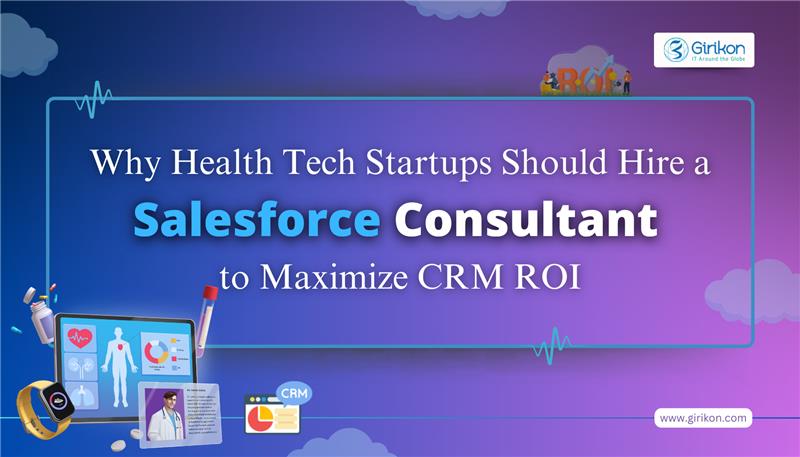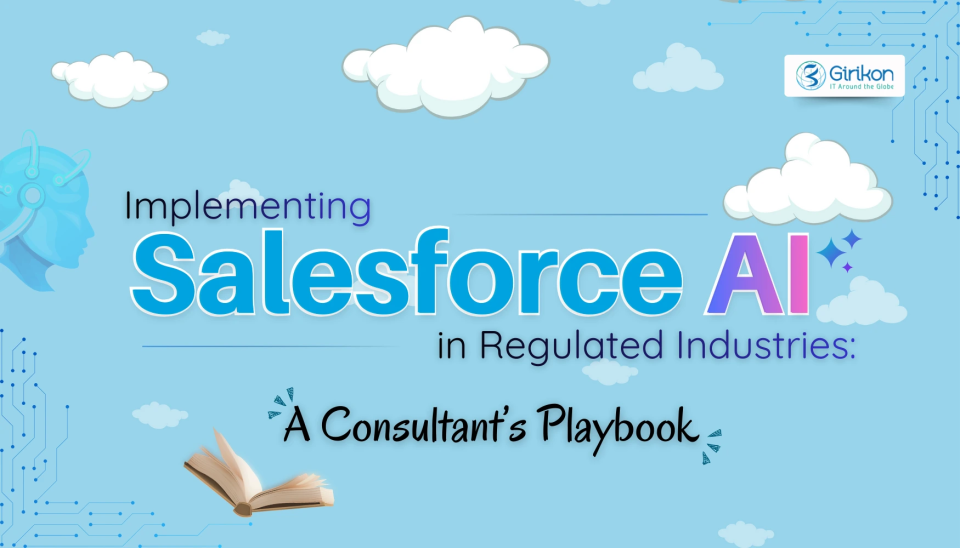Our Blogs
Startups are racing to scale, innovate, and provide wonderful patient experiences in the fast world of health tech. But there is a catch—without the proper systems, even the best of ideas will hardly catch the ever-fleeting market. That’s when Salesforce steps in, streamlining patient data, and driving better engagement like never before.

How?
Being the world’s number 1 CRM platform, it offers startups and enterprises the flexibility to centralize patient records, automate complex workflows, and deliver personalized care journeys. However, unlocking these capabilities to their fullest requires the best expertise. This is where Salesforce consultant acts as the enabler—tailoring the platform, personalizing patient care and future-proofing operations while maximizing CRM ROI in the long run.
Common CRM Challenges in Health Tech Startups
If you think building a health tech startup is the hardest part, think again. The real challenge begins when managing compliance, providers, and patients without the right CRM strategy. Things can get messy, and startups may face some serious issues like:
- Manual And Inefficient Workflows
When a whole lot of things-from sending out reminders of appointments to approving insurance-are done manually, healthcare providers face slower processes and even greater chances of errors, thereby compromising the quality of patient care.
- Fragmented Patient Data
Relying on siloed tools, disconnected apps, and spreadsheets may lead data like patient records, billing details and appointment history to different places. Thus, making it hard for the professionals to get a 360-degree view of patient data.
- Compliance & Data Security
Healthcare data is highly sensitive and with generic CRMs, health startups often struggle to meet GDPR and HIPAA requirements. Without the proper grip on data, they may risk loss of patient trust and regulatory compliance.
- Lack of Actionable Insights
Data without analytics is just noise. For health tech startups, this means struggling to monitor pipeline health, track patient engagement or measure care outcomes. All these are essential for further decision making. However, missing any of these can lead only to slowing growth.
- Scalability Issues
What works smoothly for 100 patients often collapses when scaling to 10,000. Although most startups outgrow their basic tools too quickly, this won’t work until they follow the right strategy and upgrade their CRMs for further growth.
Why Salesforce is the Right Fit for Health Tech
- Scalability for growing startups
No matter if you are managing 100 and 10,000 patient records, Salesforce is the ultimate solution you need as it grows with your business. Given the flexible architecture, health tech companies can integrate additional new integrations, users, and features without disrupting existing workflows.
- HIPAA-compliant infrastructure
In healthcare, data security is not optional but non-negotiable. That's why every startup must ensure HIPAA compliant infrastructure powered by Salesforce. Not does it safeguard sensitive patient data while meeting strict regulatory requirements but also provides startups with the confidence to innovate, without compromising compliance.
- Pre-built healthcare accelerators
With every basic and essential tool provided inside Salesforce, health tech startups are not required to build anything from scratch. They can just run Salesforce Health Cloud and other pre-built healthcare accelerators to use ready-to-use templates for care coordination, patient management, and better engagement.
Role of a Salesforce Consultant for Health Tech Startups
From customizing patient’s journey to ensuring compliance and security, Salesforce solution consultant plays a crucial role to turn Salesforce into a growth engine that scales with the engine.
- Aligning Salesforce with specific business models
Every healthcare tech startup has a unique operating model—some focus on remote monitoring, others on digital therapeutics, and the rest on telehealth. What your core needs are is established by Salesforce consultants. They analyze your core business model, therein, tailoring the features to fit your care delivery and revenue streams.
- Customizing patient journeys and workflows
Patient engagement is not linear—it involves onboarding care coordination, follow-ups, and other processes. And Salesforce consultants for health tech startups, already aware of this, design such a workflow and automated journey that handles everything from post-care surveys to appointment reminders, ensuring a personalized patient experience.
- Ensuring compliance and data security
Being operated in a highly regulated environment, healthcare startups face legal and financial risks even when a small compliance gap arises. That's where the Salesforce consultant for health tech startups comes, configures security protocols, aligns processes with HIPAA, and manages other healthcare regulations like a pro. This helps protect sensitive patient data while keeping operations audit-ready.
Practical Use Cases of Salesforce in Health Tech
Here are real-world applications highlighting how Salesforce streamlines care coordination and billing, thus translating into better experience for both patients and providers.
- Managing clinical workflows and medical records
The whole medical record is centralized in one secure platform by Salesforce, which provides instant access to accurate data for the healthcare providers. Automated workflows assist operations by way of cutting redundancy in paperwork and allowing coordination regarding care. Together, this will lay the very bedrock of organizations coordinating better patient outcomes and more efficient care.
- Streamlining billing, financial aid, and insurance
Financial operations often overwhelm healthcare startups, but not when they have salesforce financial cloud consulting, automating everything from billing cycles to payment reminders and claim submissions. With automation, workflows ensure streamlining the delivery of updates about insurance and financial aid eligibility to clients. Hence, such workflows reduce errors, speed up reimbursements, and give clarity to the patients financially.
- Real-time communication among patients, doctors, and staff
Through Salesforce-powered SMS/Email integration, patients can quickly connect with providers and staff members whenever in need. Moreover, they can get timely reminders and treatment instructions for better care quality. Even, the staff is not required to juggle multiple tools when there is an emergency. This level of smooth communication reduces delays in treatment and strengthens patient-provider relationships.
- Automating patient onboarding and follow-ups
By automating everything from initial assessments to form submission and consent processes, Salesforce allows startups to digitize onboarding. Moreover, it makes the first experience smooth with step-by-step guidance through personalized workflows. Ultimately, this ensures patients don’t miss check-ups and leads to reduced care gaps and boosted engagement significantly.
To Sum it Up!
No startups are strangers to challenges and health tech is no exception. No matter if it is about scaling patient records, managing compliance, and delivering personalized care at speed, there will be obstacles at every step.
However, with Salesforce, the dust gets settled. Not only does it deliver care journeys that feel truly personalized but also maintain patient trust and drive data-backed decisions for growth.
But, yet again, to make the most of this platform in a landscape where patient experience and compliance define success, you must hire Salesforce consultants. So, without any further delay, get the competitive edge your startup needs and step into the future of digital healthcare.

 +1-480-241-8198
+1-480-241-8198 +44-7428758945
+44-7428758945 +61-1300-332-888
+61-1300-332-888 +91 9811400594
+91 9811400594


















